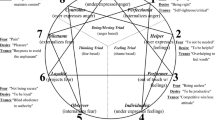Abstract
Historically, theories of personality and therapy have tended to be biased against women Feminist ideology appears to be inadequate as a replacement for more traditional theoretical frameworks. Alternatively, the existential theory of Frankl (1969, 1975) appears particularly promising as a model for therapy with women. Data in support of this position were reported.
Similar content being viewed by others
References
Alberti R.E., and Emmons M.L. (1970). Your perfect right. San Luis Obispo: Impact.
Bardwick J. (1979). In transition: How feminism, sexual liberation, and the search for selt-fulfillment have altered America. New York: Holt, Rinehart & Winston.
Bazelon D. (1972). Strong women, weak men—or unisex. Review of Existential Psychology and Psychiatry, 11: 130–143.
Bem, S. (1972). Psychology looks at sex roles: Where have all the androgynous people gone? Paper presented at UCLA Symposium on Women, May.
Bem S. (1974). The measurement of psychological androgyny. Journal of Consulting and Clinical Psychology, 42: 155–162.
Bem S. (1976). Probing the promise of androgyny In A. Kaplan and J. Bean (Eds.) Beyond sex role stereotypes: Readings toward a psychology of androgyny Boston: Little. Brown & Co.
Bem S.L., and Bem D.J. (1970). Training the women to know he place. The power of a nonconscious ideology. In D.J. Bem, (Ed.), Beliefs, attitudes and human affairs California Wadsworth.
Burlin E., and Guzetta R. (1977). Existentialism: Towards a theory of psychotherapy for women. Psychotherapy: Theory, Research and Practice, 14: 262–266.
Chesler P. (1972). Women and madness, New York: Avon Books.
Crumbaugh J. (1968). Cross-validation of Purpose in Life test based on Frankl's concepts Journal of Individual Psychology, 24: 74–81.
Crumbaugh J. (1977). The seeking of noetic goals test (SONG): A complementary scale to the purpose in life test (PIL). Journal of Clinical Psychology, 33: 900–907.
Crumbaugh J., and Maholick L. (1964). An experimental study in existentialism. The psychometric approach to Frankl's concept of noogenic neurosis. Journal of Clinical Psychology, 20: 200–207.
Crumbaugh J., and Maholick L. (1964). Manual of instructions for the purpose and meaning in life test. Munster, Ind.: Psychometric Affiliates.
Crumbaugh J., Raphael M., and Schrader R. (1970). Frankl's will to meaning in a religious order. Journal of Clinical Psychology, 26: 206–207.
Cust, M. (1978). Women's development as persons. Ph.D. thesis, University of Alberta.
Doherty M.A. (1973). Sexual bias in personality theory. The Counseling Psychologist, 1 64–74.
Erikson V. (1977). Beyond Cinderella: Ego maturity and attitudes towards the rights and roles of women. The Counseling Psychologist. 7: 83–88.
Evans D. (1976). Emerging truths on the psychology of women, as through a glass darkly. The Counseling Psychologist, 6: 60–64.
Frankl V. (1969). The will to meaning. New York: New American Library.
Frankl V. (1973a). The doctor and the soul. Harmondsworth, England, Penguin Books
Frankl V. (1973b). Psychotherapy and existentialism. Harmondsworth. England Penguin Books.
Frankl V. (1975). The unconscious god. New York: Simon & Schuster
Hjelle L., and Butterfield R. (1974). Self actualization and women's attitudes towards their role in contemporary society. The Journal of Psychology, 87: 225–230.
Holroyd J. (1976). Psychotherapy and women's liberation. The Counseling Psychologist, 6: 22–27.
Jones W., Chernovitz M., and Hanson R. (1978). The enigma of androgyny: Differential implications for males and females? Journal of Consulting Psychology, 46: 298–313.
Kaplan A. (1976). Androgyny as a model of mental health for women From theory to therapy In A. Kaplan and J. Bean (Eds.) Beyond sex role stereotypes: Readings toward a psychology of androgyny. Boston: Little, Brown & Co.
Knefelkamp L., Widick C., and Stroad B. (1976). Cognitive developmental theory: A guide to counseling women. The Counseling Psychologist, 6: 15–19.
May R. (1972). Power and innocence. New York: Dell.
Mednick M., and Weissman H. (1976). The psychology of women: Selected topics. Annual Review of Psychology, 26: 1–18.
Meier A., and Edwards H. (1974). Purpose in life test: Age and sex differences. Journal of Clinical Psychology, 30: 384–386.
Miller J.B. (1976). Toward a new psychology of women. Boston: Beacon.
Noonan, B.A. (1975). Women's search program: Outcomes and assessment. Paper presented at CACUSS Conference, Quebec City, June.
Noonan, B.A., and Wilgosh, L. (1979). An evaluation of theoretical models for counselling women. Paper presented at CRIAW Conference, Edmonton, November.
Patterson C. (1973). Theories of counseling and psychotherapy. New York: Harpet & Row.
Phillips W., Watkins J., and Noel G. (1974). Self-actualization, self-transcendence and personal philosophy. Journal of Humanistic Psychology, 14: 53–73.
Schmidt, L. (1973). Sex roles and life styles of professional women. Unpublished doctoral disser tation, University of Alberta.
Spence J., Helmreich R., and Stapp J. (1973). A short version of the Attitudes toward Women Scale (AWS). Bulletin of the Psychonomic Society, 2: 219–220.
Spiegel S.B. (1979). Separate principles for counselors of women: A new form of sexism. The Counseling Psychologist, 8: 49–50.
Stricker G. (1977). Implications of research for psychotherapeutic treatment of women. American Psychologist, 32: 14–22.
Tanney M., and Birk J. (1976). Women counselors for women clients? A review of the research. The Counseling Psychologist, 6: 28–32.
Turner, M., and Noonan, B. (1976). Women's search program: A follow up study. Paper presented at Conference on Research on Women: Current projects and future directions. Halifax, November.
Turner, M. (1977). Career planning workshops for women: Assessment of critical factors related to outcomes. Master of Continuing Education thesis, University of Saskatchewan.
Whitely K. (1973). Women in groups. The Counseling Psychologist, 4: 27–43.
Williams E.F. (1977). Notes of a feminist therapist. New York: Dell.
Yarnell T. (1971). Purpose in life test: Further correlates. Journal of Individual Psychology, 27: 76–79.
Zeldow P. (1976). Psychological androgyny and attitudes toward feminism. Journal of Consulting and Critical Psychology, 44: 150.
Additional information
University of Winipeg
University of Alberta
Rights and permissions
About this article
Cite this article
Noonan, B., Wilgosh, L. An existential model for counselling women. Int J Adv Counselling 4, 35–43 (1981). https://doi.org/10.1007/BF00116528
Issue Date:
DOI: https://doi.org/10.1007/BF00116528




